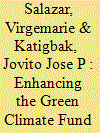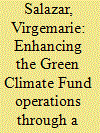| Srl | Item |
| 1 |
ID:
142876


|
|
|
|
|
| Summary/Abstract |
The ability of the parties to the United Nations Framework Convention on Climate Change to negotiate an effective agreement for the post-2020 period is highly dependent on whether developing countries should take on binding mitigation commitments. This analysis combines an historical with a discursive institutionalist perspective to trace the conflict around developing country mitigation that accompanies the climate change regime since its inception. The article shows that early decisions on the subject matter shaped the regime until now. At the same time, the discourse and more recent decisions concerning developing country mitigation indicate gradual changes nevertheless. In particular, the Conferences of the Parties in Bali 2007 and Durban 2011 produced outcomes that changed the institutional architecture of the regime significantly. The development of the climate regime regarding developing country mitigation is hence marked by both periods of change and stasis.
|
|
|
|
|
|
|
|
|
|
|
|
|
|
|
|
| 2 |
ID:
188906


|
|
|
|
|
| Summary/Abstract |
The prevailing issues in the Green Climate Fund on implementation and governance can be seen as symptoms of the ills of the international climate finance architecture. These are compounded by the inadequate financial support provided by developed countries to developing countries and the low volume of funding channelled to adaptation projects. Evidently, the cited issues highlight the need to fully integrate the principles of justice and equity into the global climate change regime. Thus, this policy brief discusses the key challenges related to climate finance, and outlines several options and considerations on improving the Green Climate Fund operations using a climate justice lens. This paper intends to take a more normative and ethical discussion on the topic of climate finance.
|
|
|
|
|
|
|
|
|
|
|
|
|
|
|
|
| 3 |
ID:
188916


|
|
|
|
|
| Summary/Abstract |
The prevailing issues in the Green Climate Fund on implementation and governance can be seen as symptoms of the ills of the international climate finance architecture. These are compounded by the inadequate financial support provided by developed countries to developing countries and the low volume of funding channelled to adaptation projects. Evidently, the cited issues highlight the need to fully integrate the principles of justice and equity into the global climate change regime. Thus, this policy brief discusses the key challenges related to climate finance, and outlines several options and considerations on improving the Green Climate Fund operations using a climate justice lens. This paper intends to take a more normative and ethical discussion on the topic of climate finance.
|
|
|
|
|
|
|
|
|
|
|
|
|
|
|
|
| 4 |
ID:
092735


|
|
|
|
|
| Publication |
2009.
|
| Summary/Abstract |
The climate-trade nexus gains increasing attention as governments are taking great efforts to forge a post-2012 climate change regime to succeed the Kyoto Protocol. This raises the issues of the scope of trade-related measures and of when and how they could be used. This paper discusses how far trade-related measures should be incorporated in that context. Drawing on an analogy to the Montreal Protocol and comparing developing country's climate mitigation and adaptation needs with the funding available, the paper argues that such measures should initially be applied only among Annex I or II countries. To discipline the use of unilateral trade measures at the international level, the paper emphasizes a need to define comparable climate efforts. Moreover, the Lieberman-Warner bill in the US Senate-taken as a proxy for future US climate legislation-is assessed, and found to be neither effective nor likely to be WTO-consistent. The paper is concluded by arguing that, in order to encourage developing countries to do more to combat climate change, developed countries should focus on carrots. Sticks can be incorporated, but only if they are credible and realistic and serve as a useful supplement to push developing countries to take actions or adopt policies and measures earlier than would otherwise have been the case.
|
|
|
|
|
|
|
|
|
|
|
|
|
|
|
|